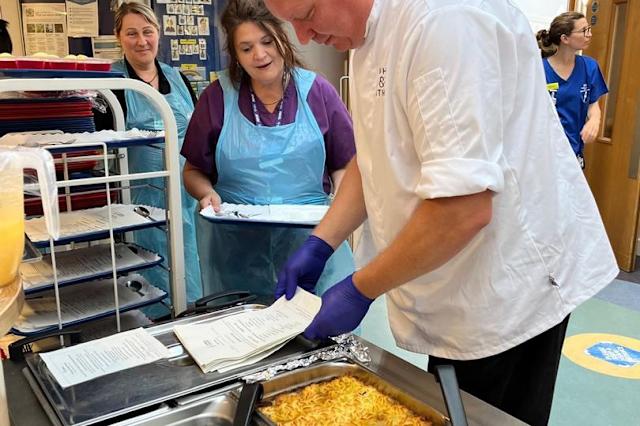Chef Spencer Richards, based at Sobell House Hospice in Oxfordshire, has dedicated his culinary expertise to providing comfort to patients in their final days. His approach goes beyond mere sustenance, aiming to fulfill the unique food desires of each individual, thereby offering a sense of normalcy and joy during a challenging time.
Personalised Culinary Experiences
Richards believes in the profound impact of personalized meals. He recalls preparing street food for a 21-year-old patient who found the standard menu unappealing, ensuring the young man enjoyed his preferred cuisine. In another instance, he baked a birthday cake for a 93-year-old woman who had never celebrated her birthday with a cake, leaving her “in tears” and “over the moon.” Such gestures highlight the emotional significance of tailored meals in hospice care.

Adapting to Health Needs
Understanding the health challenges faced by patients, Richards adapts his cooking to accommodate dietary restrictions and changing tastes due to treatments like chemotherapy. He notes that many patients develop a sweet tooth or become sensitive to salt, prompting him to adjust recipes accordingly. For those unable to consume solid foods, he creates visually appealing and flavorful alternatives like jelly or ice cream, ensuring that every patient can enjoy their meals.
The Emotional Impact of Food
Richards emphasizes that food serves as a powerful emotional connector. He shares that families often return to express gratitude for the comfort his meals provided their loved ones. One family even brought food to the hospice staff on Christmas Day as a token of appreciation, reinforcing the deep emotional resonance of his work.
A Broader Perspective on Hospice Cuisine
Richards’ approach aligns with a broader movement in hospice care that recognizes the importance of personalized and comforting meals. At Ashgate Hospice, for example, the catering team goes above and beyond to fulfill special requests, such as organizing themed meals or facilitating family dining experiences, underscoring the role of food in enhancing the quality of life for patients.
Finding Purpose Through Cooking
For Spencer Richards, working as a hospice chef is more than just a job—it’s a calling filled with purpose and empathy. Each dish he prepares is crafted with care, often involving a conversation with the patient or their family to understand meaningful food memories or cultural preferences. These stories inspire him to recreate not only meals, but moments of joy and remembrance. Whether it’s a traditional Sunday roast, a beloved childhood dessert, or a simple cup of tea made “just right,” Richards sees these meals as a final gift.
His dedication has also influenced colleagues, encouraging a culture where kitchen staff feel part of the caregiving team. As more hospices embrace this model of care, Richards hopes it will inspire others to view food as a vital part of emotional and palliative support. In many ways, his kitchen is not just a place for cooking—it’s a space for healing and human dignity.

Conclusion
Through his dedication, Chef Spencer Richards exemplifies how personalized, thoughtful meals can provide comfort and joy to hospice patients. His work highlights the profound impact of food in end-of-life care, serving not just as nourishment but as a source of emotional solace and human connection.

















